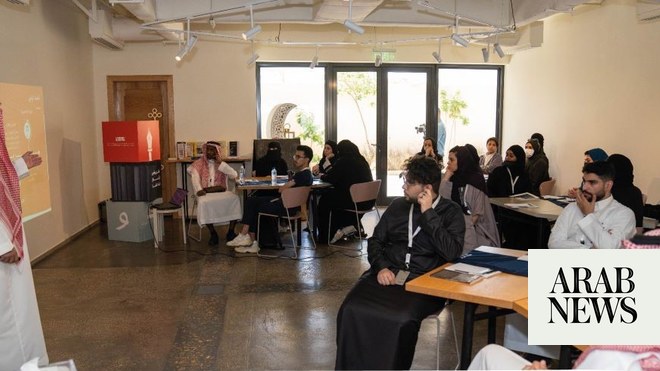
Primary focus is to rid society of misconceptions and stereotypes about the medical condition
JEDDAH: Saudi students and experts alike are spreading awareness among different age groups on attention deficit hyperactivity disorder, otherwise known as ADHD, a misunderstood and often overlooked condition.
According to the American Psychiatric Association, ADHD is currently the most common mental disorder that affects children. If left undiagnosed, it can also seep into adulthood. The symptoms of the disorder include difficulty in focusing, impulsive behavior, and hyperactivity.
In Saudi Arabia, several awareness campaigns are shedding light on the medical condition. Razan Al-Ashmouri, an 18-year-old student at Effat University, is part of the “We Care” movement, an initiative launched on Instagram by a group of students to raise awareness about mental health.
Al-Ashmouri told Arab News that she first suspected she had ADHD when she was 14, but did not get diagnosed until two years later.
“It took my family a lot of convincing to let me go see a therapist and get an official diagnosis,” Al-Ashmouri said. “When I did get diagnosed, I also found out I had extreme generalized anxiety, which was a result of my late ADHD diagnosis.”
She struggled at school and always found herself in trouble.
“While in middle school, I was told to ‘grow up,’ and that the troubles I caused were childish,” Al-Ashmouri said. “I was called immature, disrespectful, and stupid a lot. I never understood why I was always the one to blame.”
The college student described having ADHD as being constantly overwhelmed.
“It is like trying to solve an exam with 10 songs playing on loudspeakers and then get blamed for not passing,” she said.
According to some experts, ADHD has traditionally been known as a disorder associated with children — primarily males — bouncing around and creating a lot of trouble in the classroom. It is often underdiagnosed. Even if some parents acknowledge these behaviors in their children, many are hesitant to get an official diagnosis because they do not want to label their children.
Khulood Al-Haddad, a disability consultant, told Arab News: “Usually, people who can not accept anything that is out of their perspective of the norm, do not accept people with such conditions. It is true that it is a challenge to make someone concentrate on something. They want to do a little bit of everything, which can prove to be a challenge for parents and educators.”
She said this is why she wants to educate people about accepting differences, promoting individual learning, allowing children to be expressive, and not conforming to one type of standard.
“Teachers in schools want all the children to have the same reactions. So, changing the mindset of people is the first key to enhancing our society and helping our children with ADHD,” Al-Haddad said.
Al-Ashmouri admitted she was happier when she was diagnosed, as it came with the reassurance that what she was going through was not her fault.
She said managing her symptoms was difficult, especially knowing that she has little to no control over her actions. Al-Ashmouri said her parents were in denial when she was first diagnosed, but her mother began to understand her condition.
“My father is still in denial and says things like ‘mental illness is not an excuse,’ and ‘you just need to work harder,’” she said. “It hurt before. But now it is OK because I know that no one will ever understand ADHD more than those who have it.”
According to Al-Haddad, there has been a recent increase in awareness among Saudi parents, who are taking a closer look at the behavior of their children. If an adult suspects they or their children have ADHD, there are plenty of options for treatment.
Al-Haddad, a medical expert, warned against reading about ADHD symptoms online. It could lead to falsely believing that students fall in the ADHD spectrum.
In reality, many are diagnosed late in adulthood and learn to deal with it long before their diagnosis is confirmed.
“A disorder is something that has a major effect on one’s life,” she said. “If your symptoms are under control, then you are fine. You need to have over five or six symptoms to be classified as someone with ADHD. If you missed your diagnosis and have learned to manage your symptoms, then you are going to be OK. But if you need help, there are always professionals who can help.”
Al-Haddad also said a cure for the medical condition is another common misconception. In fact, there is no known cure for ADHD and that it is something people need to work with. According to Al-Haddad, experts can teach people with the condition how to manage their symptoms and specific tactics to help them concentrate and cope.
“As a community, we need to accept these things as they are,” she said. “Sometimes there are things without a definite cure and that is OK. We need to stop wishing for these things to go away and learn how to co-exist and manage.”
Al-Ashmouri contributed to the list of misconceptions with her biggest pet peeve: “I hate it when people say, ‘you do not look like you have ADHD,’ just because I do not constantly run and shout, or I’m not focusing on my lecture?”
Al-Haddad strongly suggested that through education and awareness, many can liberate their minds from misconceptions and stereotypes and begin to accept and understand the facts when it comes to ADHD.












